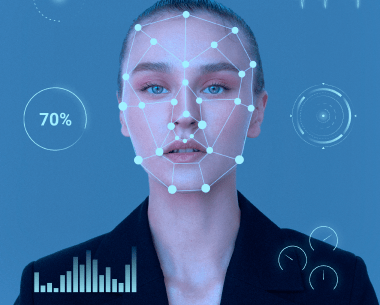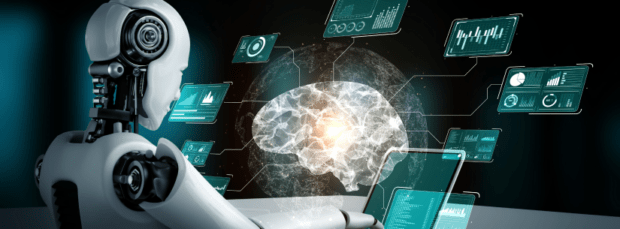In an era where technology evolves at breakneck speed, the dazzling duo of Artificial Intelligence (AI) and Machine Learning (ML) now dominate the forefront. No longer the stuff of mere fantasies, these technologies have permeated various industries, engendering profound shifts in the modus operandi of businesses.
AI manifests in systems adept at tasks once solely within the purview of human intellect—problem-solving, learning, and natural language comprehension. ML, a close relative within the AI family, concentrates on the fine art of training algorithms to absorb data, adapt, and self-enhance sans explicit programming. These technologies propel the digital metamorphosis of businesses, bolstering efficiency, nimbleness, and ingenuity.
In a world of cutthroat competition and relentless acceleration, AI and ML have allies for organizations vying for a leg up. Streamlining tasks, refining decision-making, and tailoring customer interactions, these tools empower businesses to fine-tune their inner workings, slash expenditures, and unearth untapped revenue sources. Peering deeper into the myriad ways AI and ML revolutionize business affairs, it becomes undeniably evident that adopting these innovations is no longer a mere luxury but an essential requirement for thriving in the contemporary landscape.
The role of AI and machine learning in decision-making
Data-driven decision-making is one of the most major ways AI and machine learning are changing corporate operations. Organizations produce enormous volumes of data from several sources, and AI and ML algorithms may assist in the analysis of this data to find insightful trends and patterns. With improved data analysis, organizations can make choices based on current information, increasing efficiency and performance overall.
Another crucial component of data-driven decision-making is the identification of trends and patterns.
Businesses may swiftly spot new trends, consumer preferences, and market movements by applying AI and ML methodologies. Companies are able to foresee changes, modify their strategy, and stay one step ahead of the competition because to this degree of understanding.
Another effective tool for using AI and machine learning in commercial decision-making is predictive analytics.
Predictive analytics can project future demand by using past data and sophisticated algorithms, assisting firms in better managing their resources and avoiding overstocking or understocking problems. Effective demand forecasting improves inventory control, lowers waste, and boosts profitability.
Another critical area where AI and machine learning may have a big influence is risk assessment.
These technologies provide organizations the ability to be proactive, reduce risks, and reduce possible losses by analyzing massive volumes of data and recognizing potential problems. AI-powered risk assessment tools are becoming a crucial part of contemporary corporate operations, from financial risk management to supply chain interruptions.

Streamlining and optimizing operations
Automating monotonous processes with AI and machine learning helps businesses streamline and improve operations. RPA is one such technology that uses AI and ML to automate repetitive and time-consuming processes, freeing up people to concentrate on more strategic and value-added duties. RPA greatly boosts operational efficiency and production by eliminating mistakes and lowering human interaction.
Another AI-driven technology is Natural Language Processing (NLP), which automates laborious language processing activities. In order to automate tasks like customer service, document analysis, and sentiment analysis, NLP enables computers to comprehend, interpret, and produce human language. Businesses may produce outcomes more quickly, more precisely, and consistently while spending less money by automating these processes.
Another area where artificial intelligence and machine learning are having a big influence is supply chain management. Technological algorithms can improve inventory control by correctly anticipating product demand and determining the ideal stocking levels. As a result, stockouts are kept to a minimum, inventory carrying costs are decreased, and customer satisfaction is increased.
In order to optimize logistics, AI and ML technologies are also essential. These systems can determine the most effective and economical shipping routes by assessing data from many sources, including transportation routes, traffic patterns, and weather conditions. This not only lowers transportation costs but also lessens the environmental effect of logistical activities and guarantees prompt product delivery to clients.


Personalization and customer experience
By enabling companies to develop individualized marketing tactics, artificial intelligence, and machine learning are transforming the consumer experience.
One way AI and ML are revolutionizing marketing strategies is through targeted adverts.
AI algorithms can produce highly relevant adverts that are suited to individual interests by examining client data, including browsing history, demographic data, and purchase activity. This degree of personalization increases customer engagement and boosts marketing efforts’ return on investment.
Another way that AI and ML technologies support individualized marketing tactics is through customized promotions.
Businesses may develop distinctive promotional offers that appeal to their target audience by learning about the preferences, requirements, and previous purchasing habits of their customers. This focused strategy promotes long-term partnerships, boosts sales, and encourages client loyalty.
Moreover, AI and machine learning are essential for enhancing customer service.
For instance, chatbots powered by AI may respond quickly and accurately to a variety of client inquiries. These virtual assistants are able to work continuously, guaranteeing that clients get assistance whenever they do. AI chatbots can increase customer happiness and loyalty by speeding up response times and providing individualized support.
Another AI-driven tool that improves customer service is sentiment analysis.
Sentiment analysis software can determine how customers feel about a product, service, or brand by examining customer reviews, comments made on social media, and online ratings. Businesses may answer consumer issues, make required adjustments, and proactively manage their online reputation thanks to this useful information.
Security and fraud detection
Businesses are increasingly relying on AI and machine learning to improve security and fraud detection. One such use is anomaly detection, in which AI and ML systems examine massive amounts of data to find odd behavior patterns. Businesses may avoid fraud and save financial losses by swiftly investigating possible dangers by identifying abnormalities in real-time.
Another area where AI and ML technologies shine is fraud prevention. To find potentially fraudulent activity, machine learning algorithms can examine transaction data, client profiles, and previous fraud trends. These technologies enable organizations to respond immediately and safeguard their assets and clients against harmful actors by sending out real-time notifications.
AI and machine learning is transforming the way corporations defend their digital infrastructure in the field of cybersecurity. One area where AI and ML technologies might offer insightful information is network monitoring. AI-driven systems may identify abnormalities, intrusions, and possible threats by continually monitoring network data. This enables organizations to take quick action and lessen the effect of assaults.
Another essential element of AI and ML-powered cybersecurity is threat intelligence. AI algorithms can find new dangers, weaknesses, and attack patterns by gathering and examining data from a variety of sources. Businesses can proactively increase their security posture, safeguard critical data, and uphold their customers’ and partners’ confidence thanks to this timely insight.
Future outlook and emerging trends
The future of the industrial revolution, known as Industry 4.0, will be shaped by the integration of cutting-edge technologies like the Internet of Things (IoT), big data, and automation as AI and machine learning continue to improve. Smart factories, where networked systems can automatically monitor and improve manufacturing processes, reduce downtime, and increase overall efficiency, will be made possible by AI and ML.
The adoption of AI and machine learning technology across several sectors will be accelerated by advancements in these fields. Deep learning, reinforcement learning, and transfer learning advancements will open up new possibilities and help AI and ML systems handle increasingly challenging issues. Apart from that, the creation of more potent and energy-efficient technology, including neuromorphic circuits, would hasten the processing of AI algorithms and ease real-time decision-making.
New commercial prospects and models will also arise as a result of AI and machine learning’s continuing development. Businesses will need to adjust as AI-driven automation spreads by putting an emphasis on innovation, creativity, and higher-order talents that are difficult for computers to mimic. Moreover, AI and ML will make it possible to create new goods and services that are specifically catered to the demands of each client, creating new markets and income opportunities. Businesses that use AI and machine learning technology will be better positioned to flourish and succeed in the cutthroat global market in this quickly changing environment.

Summing up
AI and machine learning are fundamentally altering how businesses operate in many different ways. These cutting-edge technologies are revolutionizing how organizations operate, compete, and win in today’s competitive market. They range from data-driven decision-making and faster operations to tailored consumer experiences and increased security measures. As AI and ML continue to develop and change Industry 4.0, giving up new chances and possibilities for organizations globally, the future holds even more innovation.
AI and machine learning’s continuing revolution of corporate processes offers both benefits and obstacles. Organizations must adapt and use the power of these technologies to streamline their operations, spur development, and retain a competitive advantage if they want to remain ahead in this fast-paced world.
Are you prepared to implement your ideas and use AI and machine learning to grow your company? With the assistance of a highly skilled professional team operating under your direction, Eventyr is here to help. For further details, contact us right now. Let us work with you to build a smarter, more creative, and prosperous future.




